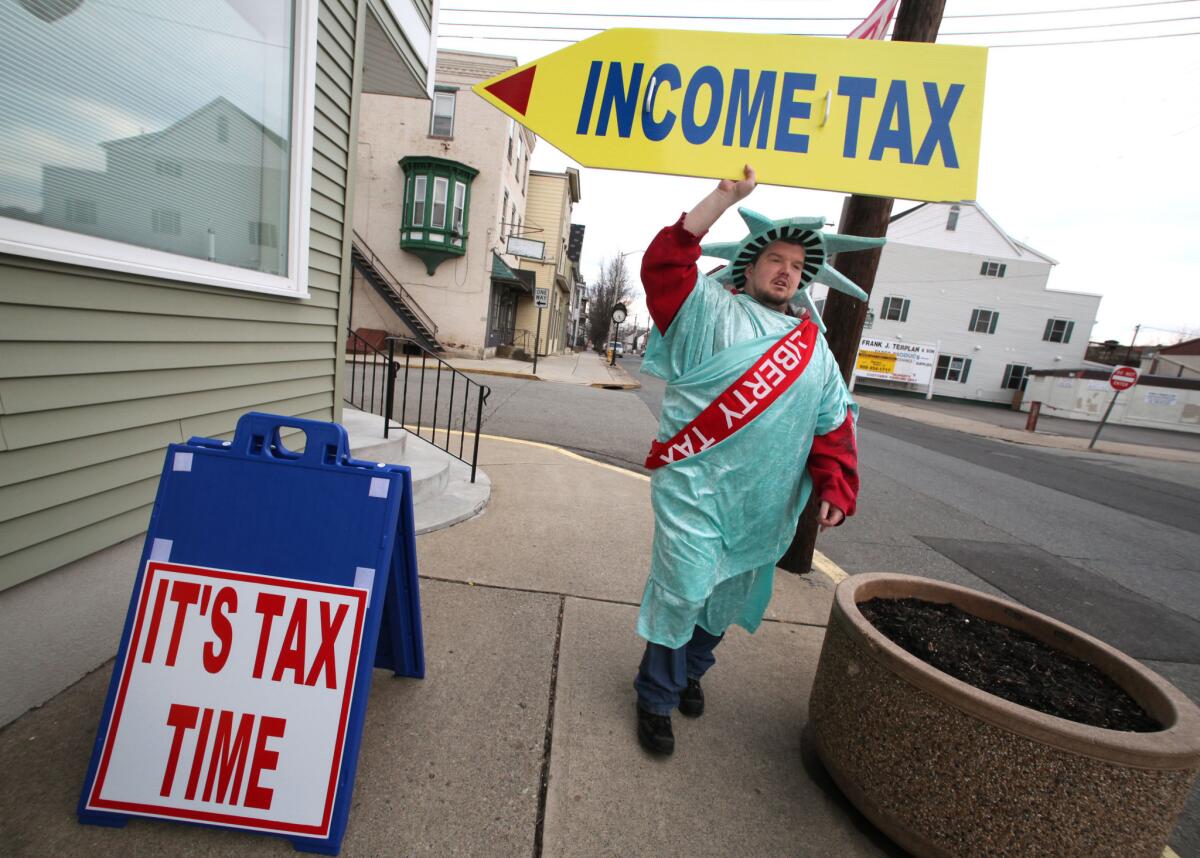Intuit moves to mollify outraged TurboTax customers -- but is it enough?

- Share via
Intuit, which is reeling from customer outrage over a surreptitious price hike this year in its market-leading TurboTax tax preparation software, has moved to quell the anger. But it may not have done enough.
The Mountain View, Calif.-based company is offering customers a $25 rebate if they unexpectedly have to upgrade from TurboTax Deluxe to a higher-priced version in order to file any of several common tax forms dealing with non-wage income. Deluxe managed those forms without difficulty in previous years.
“We messed up,” reads an email going out starting Friday to millions of TurboTax users from Sasan Goodarzi, the general manager of Intuit’s TurboTax team. “We made a change this year to TurboTax desktop software and we didn’t do enough to communicate this change to you as proactively and broadly as we could or should have. I am very sorry for the anger and frustration we may have caused you.”
But Goodarzi still hasn’t offered a coherent explanation for why TurboTax hollowed out Deluxe in the first place. “We’re very customer-driven,” he told me. “We didn’t do this for revenue reasons.” Intuit says the change has something to do with reducing customer confusion, which is odd since it’s had the opposite effect.
The rebate is offered to customers who filed their taxes using Deluxe last year, but have to use TurboTax Premier or Home & Business, which list for $30-$40 more, this year. They can’t apply for the rebate until they’ve filed their taxes electronically, and they must do so by April 15. (Street prices for these programs are much lower, especially this early in the tax season, but some differential among the versions remains.)
As we reported last week, the change in TurboTax involved schedules C, D, E and F, which are needed to report capital gains and losses such as from stock, bond and mutual fund transactions (Schedule D); sole proprietorships such as home businesses (C); rents, royalties and partnerships (E); and farm income (F). Though not every TurboTax user needs these, millions of taxpayers with non-wage income do.
This year, when TurboTax Deluxe users reach the point in their tax preparation where these forms have to be filled out, the program tells them no dice: They have to upgrade to Premier or Home & Business.
TurboTax commands roughly 60% of the home tax software market. Its leading rivals, H&R Block and TaxAct, have exploited the uproar by pointing out their lower price and equivalent functionality--H&R Block even offers its software for free to discontented TurboTax users.
That’s a crafty move, because home tax preparers are creatures of habit: Once they get accustomed to a particular software, they’re loath to switch unless given a good reason--as Intuit did. I haven’t used the rival programs, so I can’t vouch for their quality, reliability or ease of use. But reviews by Consumer Reports and others suggest that there hasn’t been much difference among them--possibly not enough to justify the price difference of $20 more between, say, TurboTax Premier and the cheaper H&R Block Deluxe. Your own tax situation may warrant one choice or another.
Intuit’s rebate offer may help to mollify TurboTax users, but it’s unduly complicated and leaves many questions unanswered.
To begin with, forcing users to apply for the rebate only after they’ve paid for the upgrade and e-filed their taxes is a pain in the neck. The expiration date locks out customers who use TurboTax to figure what they must pay the government by the payment deadline of April 15, but then take advantage of the automatic extension that allows anyone six months more to file their returns. Intuit says if they don’t file by April 15, they won’t get a rebate.
It’s also unclear what Intuit will do for former Deluxe users going forward. Goodarzi says the company is pondering whether to grandfather them in the future, but hasn’t made a decision. If not, then the price hike it’s rebating this year, and the resulting anger, will only return next year.
And why require customers to go through the rebate process in the first place? Intuit is perfectly capable of simply restoring the old functionality to Deluxe by delivering upgrades online--as all TurboTax users know, the program automatically checks for and downloads forms and functions that have changed since the last time it was opened. It’s as if the Coca-Cola Co. responded to its “New Coke” fiasco of 1985 by offering customers the old Coke, but only if they proved they’d quaffed and hated the new version and mailed in a form to get the replacement.
Intuit spokeswoman Julie Miller explained that simply restoring the deleted forms to TurboTax Deluxe would make it too complicated. “Offering a whole bunch of extra complexity in there when someone doesn’t need it isn’t helpful,” she says. To a TurboTax user, that will make no sense. The program works by asking users a series of questions and filling out forms as needed; if you answer “no” when asked if you bought or sold stocks this year, then you’ll never see Schedule D. Where’s the complexity?
What irks many customers and commentators is the gobbledygook of Intuit’s rationalization. In our interview, Goodarzi didn’t do much to add clarity. He implied that some TurboTax customers were becoming frustrated upon discovering that they had the wrong version for their needs. Intuit’s changes make that less likely. “We tried to be very clear about what product is right for which customer,” he told me, “and ensure that we deliver an awesome experience and at the same time deliver innovation.”
If there’s an explanation there for why Intuit reduced the usefulness of a program users were perfectly happy with, upselling them to a more expensive package, I can’t find it. Deluxe users understood well that it was the right thing for them, until Intuit changed it.
It’s hard to escape the feeling that Intuit is overconfident in the superiority of TurboTax, so it could feel it can hit users with a higher price without serious consequences. “Although we put ourselves in this situation where H&R Block and others are exploiting it,” Goodarzi says, “this is our zone, and customers choose us because of the ease and simplicity of what we do.” Not this year.
Keep up to date with the Economy Hub. Follow @hiltzikm on Twitter, see our Facebook page, or email mhiltzik@latimes.com.
More to Read
Inside the business of entertainment
The Wide Shot brings you news, analysis and insights on everything from streaming wars to production — and what it all means for the future.
You may occasionally receive promotional content from the Los Angeles Times.











